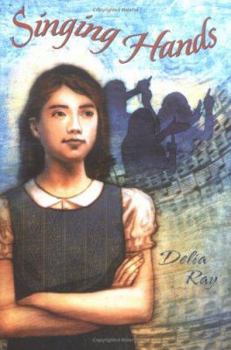Singing Hands
As one of three hearing daughters of deaf parents, 12-year-old Gussie Davis is expected to be a proper representative of Saint Jude's Church for the Deaf in Birmingham, Alabama, which is run by her... This description may be from another edition of this product.
Format:Hardcover
Language:English
ISBN:0618657622
ISBN13:9780618657629
Release Date:May 2006
Publisher:Clarion Books
Length:248 Pages
Weight:1.55 lbs.
Dimensions:1.0" x 6.5" x 8.4"
Age Range:10 to 12 years
Grade Range:Grades 5 to 7
Customer Reviews
2 ratings
The Compulsive Reader's Reviews
Published by Thriftbooks.com User , 15 years ago
Gussie Davis never meant to be disrespectful by humming aloud in church. She was just tired of trying to follow the sermon. And besides, no one noticed. How could they, when everyone is deaf? But when an unexpected visitor--one that CAN hear--gets her into trouble with her deaf parents, it will set Gussie on a path that will teach her love, acceptance, respect, and most of all, integrity. Delia Rey's Singing Hands reveals the prejudice that those who were without hearing were exposed to in the 1940's, and how resilient and resourceful they became. Very well researched, it is a testament of how cruel and unforgiving the land of the free can be to those who are different. Gussie is caught between two worlds, the hearing one, and the deaf one, and her struggle to find her place is realized through her escapades that will entertain, sadden, and inspire readers as Gussie finally learns that she can embrace one world without rejecting the other.
Make it simple, to last your whole life long
Published by Thriftbooks.com User , 17 years ago
Different books have different attitudes when it comes to grabbing your average child reader's attention. Sometimes a children's title, particularly if it happens to be of the historical fiction persuasion, will meander about. It'll lazily traipse its storyline hither and thither, confident that young readers will find the will or the desperation to follow it wheresoever it may go. Then there are books like Delia Ray's, "Singing Hands". You open the book and the first thing you see is a twelve-year-old preacher's daughter of a deaf congregation humming up a storm right smack dab in the middle of her father's communion. THAT wakes your average reader up, and from there on in it keeps a tight headlock on your attention so that all a person can do is read straight through to the end without interruption. That too is Ms. Ray's charm. Any writer can tell a story that has an interesting concept. Few, however, could find a way to wrangle that interest to the ground within the space of a couple opening sentences. "Up until the summer of 1948, when I was twelve, probably the worst thing I ever did was hum in church". So says Gussie Davis. Gussie and her sisters are the hearing daughters of deaf parents and as such they have an interesting life. Knowing full well the naughtiness of what she does, Gussie hums away like a bandit during her father's services, until the day she is outed by a fellow hearing person visiting that Sunday. Her father takes this to mean that Gussie misses singing and before she knows it our heroine is being bussed off every Sunday to a local hearing Episcopal church. Not long thereafter Gussie starts skipping Sunday school and purloining the collection money. Oh, and did I mention that she also stole a neighbor's old love letter on the sly? Between the hearing world and the deaf one, Gussie's losing her place. It's going to take a trip to a deaf school and a chance to buck the system while there to give this girl the confidence she so desperately needs. The book takes place in 1948 Birmingham, Alabama, which is a difficult time period to say the least. No responsible writer could ever tackle such a period, no matter what their subject matter, without giving at least a little attention to the prevalent racism of the time. Fellow 1944 North Carolina set children's novel "Blue" by Joyce Moyer Hostetter did a similar thing this year, but in the case of "Blue" the African American subplot felt forced and unnecessary. Here Ray weaves the story of Abe, a deaf black child, smoothly within Gussie's greater tale. Abe is sent, at Gussie's father's suggestion, to a school for black deaf children. The school is separate and cheaper than its white equivalent, allowing Ray to show rather than tell the problems with segregation at the time. Best of all, Gussie is able to view this unfair situation and become infuriated by it without ever feeling like a 21st century girl living in a 20th century novel. No mean feat. Kudo





